‘I was captured by Hamas. They killed 120 on my kibbutz. Somehow I survived’
What Adi Efrat saw and heard at Be'eri on Saturday 7 October will haunt her forever. This is her story
On Saturday 7 October more than 120 men, women and children of Kibbutz Be’eri were slaughtered by Hamas terrorists. Adi Efrat miraculously survived and is in London to give testimony to Jewish News.
At the north London home of Jewish Futures’ Rabbi Naftali Schiff, Adi says the majority of fellow survivors from Be’eri have been evacuated to a hotel near the Dead Sea, with others in a hotel in Tel Aviv.
She says: “I feel that we are still in survival mode. Most of the people can’t go back to their jobs. Israel is in state of war. Everything has changed. We are having to reinvent ourselves.
“I try to avoid the news. I’ve been told and I’ve seen pictures of the many demonstrations by pro-Palestinians and it’s hard for me because people were at my door trying to kill me, my friends, my family. They did a massacre. And after one day people forgot. They’re focusing on something else. I can’t understand how it can be.
“It’s hard for me. I don’t have a home any more. I don’t have a kibbutz. Our community has been torn down. We’re separated. It’s going to take many years to rebuild. If it’s safe to go back. Even though it’s so hard to talk about it, over and over again, it’s important. That’s the reason I do it.”
“My story is not the most devastating one. My friends have stories about their husbands being shot in front of their eyes.”
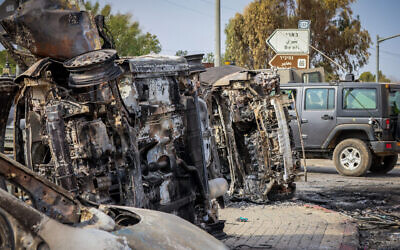
She speaks of one woman hiding with her badly wounded husband. She took his gun as she saw the rifles coming at the door.
“She had to shoot the terrorists, then held her husband and had to ask his permission to leave him there because she had to run out of the window, because of all the smoke coming into the safe room. And now she’s a widow. And she can’t come here and tell her story. So it’s my job to tell mine. So I do it, even though it’s hard.”
Hamas attacked on Saturday 7 October, when Adi’s husband and 21-year-old daughter were at different places across the kibbutz. Her son was in the north and was safe.
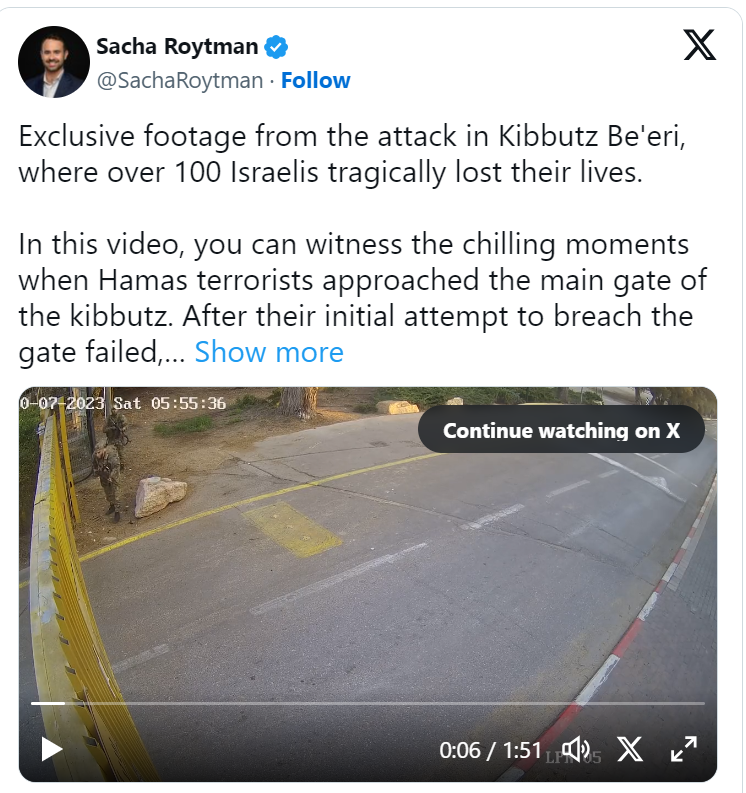
Adi says: “Our lives were threatened for so many hours. Many houses were broken into, bombed and shot at. Some people were crying for help and no help came for many hours. You can hear the terrorists. You can hear Arabic outside the door. Gunshots being fired. That’s crazy to be frightened for so long. That’s trauma in itself.”
She was praying that what was happening to her friends and neighbours wouldn’t happen to them.
“I hear them at my door. And I let my family know via WhatsApp because we are afraid to talk.”
By about 9.30am she says she knew her husband’s house was on fire and she and her daughter were begging him to stay in the safe room. Adi told him to stay there “because to die from smoke was perhaps not so fast and maybe the IDF would come and save him.”
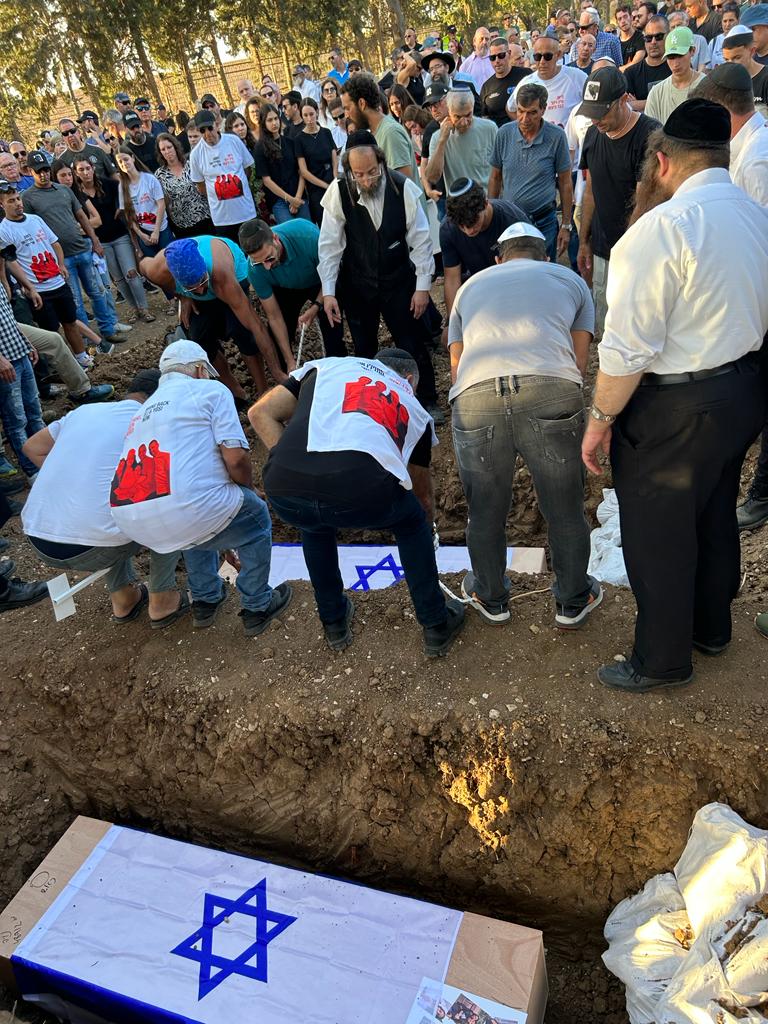
Adi says she hoped that if she made no noise, they’d think no one was home.
“But I heard them trying to break my door down. And after seconds they were inside my safe room. I was very scared. I could hear my heart pounding so hard, so fast.”
The first thing the terrorist said to her was: “Don’t worry, we’re not going to hurt you.” Adi says: “I was eased for a second. But I told him, ‘I don’t believe you.’
“There were two. They were wearing civilian clothes. They were armed. I begged them not to take me, but they didn’t listen. They told me they had finished what they had done here and they wanted to just go home but they needed her car.”
Adi tried to explain that as a socialist community, the kibbutz didn’t have private cars. “They looked like they didn’t believe me. I was shivering. I was trying to think, what can I do? I remembered the kibbutz has many cars and told them I would tell them where they were parked.”
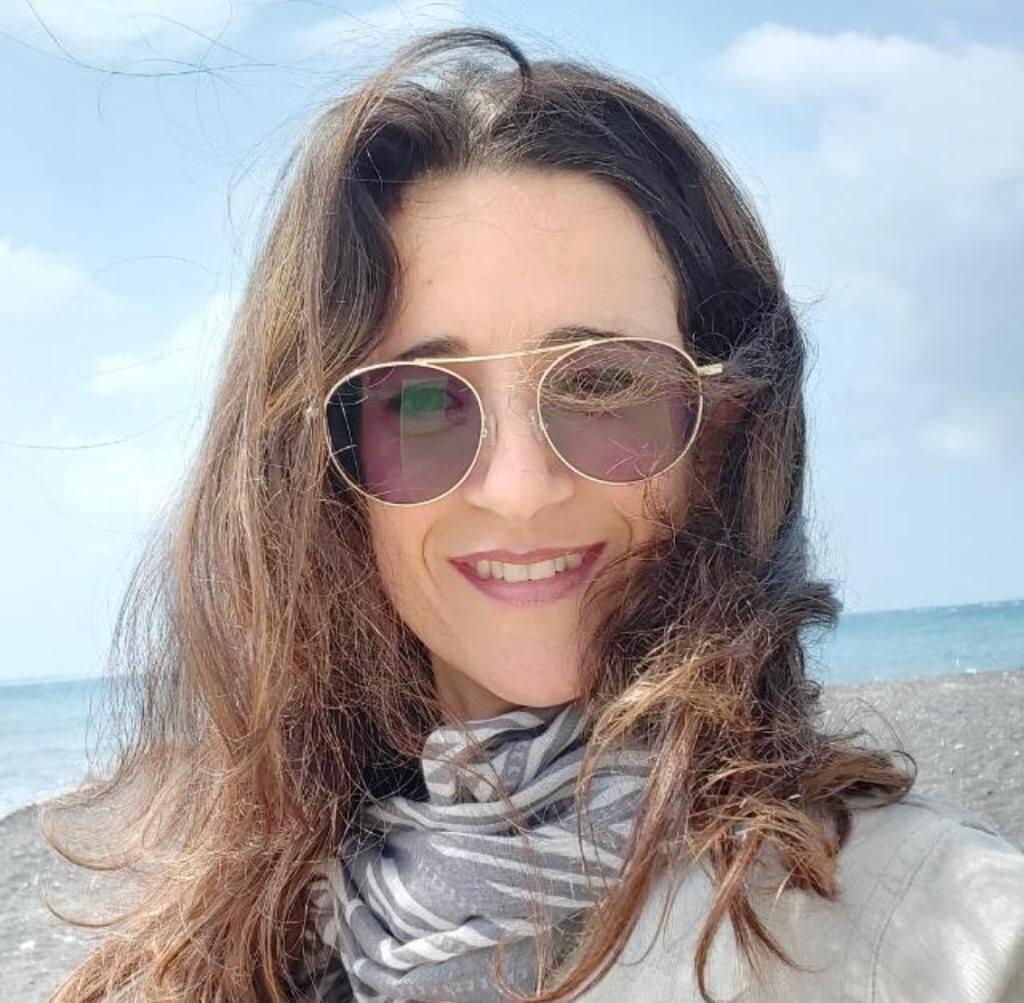
She handed over an immobiliser to unlock every single key and told them they could have all the cars they want.
“They spoke to each other in Arabic,” she says. “I can speak very basic Arabic because my parents made aliyah from Morocco in 1956. So I told them in Arabic ‘a hundred cars’. They looked excited to know they could have that many. I felt relieved that they would go away. I tried to point in the direction of the dining room and they were confused, saying I had to come with them. I begged them to leave me alone.”
When the terrorists first entered Adi’s safe room, they asked for her phone.
She says: “They put my phone into a bag which had a lots of others. So I understood from that they had taken people hostage. It was frightening for me to go with them but I had no choice. They had rifles with them. I asked them to let me change my clothes. I had only my pajamas on. They let me, but all the time they were looking, checking, maybe that I didn’t have any weapons.”
Adi told Jewish News she didn’t think ‘even for a second’ about trying to find something to defend herself with. “I didn’t think about being smart or to resist them. No. I was thinking about co operating. I was thinking about saving myself. I was thinking about my family, who would be worried sick about me.”
The last thing she’d written on their family WhatsApp chat was ‘They’re here’. And now her phone was gone.
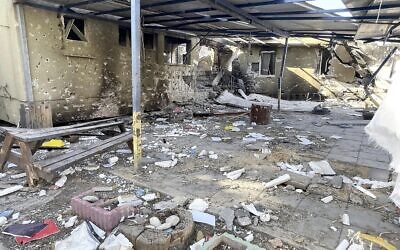
The terrorists then took Adi, gripping her hand firmly “to make sure I’m with them all the time. The one that spoke English tried to make small talk and that was very odd. Asking me where I’m from, do I have a husband, do I have kids. So I made conversation with him. I asked him questions as well.”
She recalls the terrorist responding that he had “kids… too many kids”.
Reaching a main road on the kibbutz, they heard gunshots at a distance.
Adi says: “They got startled and held me strongly by the hand and told me to run with them. It was scary, not because of the gunshots but because the hope I had for them to get the cars and go was shattered. They were running towards the west and west for me is the Gaza Strip. And I understood that there was a strong possibility for me to be a hostage.”
Picking up a map of the kibbutz, Adi now points out to Jewish News the locations of herself and her husband and her daughter’s houses, describing where she heard the gunshots and where she was dragged by the terrorists.
She says that one Hamas terrorist told her: “Don’t worry, we’re going to take you to a place where there’s women like you,” and they took her to the back yard of another house where she was met by an elderly woman and her carer.
The carer was handcuffed from the front and three terrorists were there, looking “very organised, very strict with their orders, fast”. The terrorists that had taken her from her house were already gone.
“They zip-tied my hands from behind, very hard and very painful. They took my sunglasses from my face, even though I explained to them that they are prescription and I cannot see without them. The old lady was eating an apple. She had dementia so was asking questions all the time, and was being told to ‘shush’. We’re trying to explain to her that she’s not allowed to talk. A few minutes went by and I heard a child, a toddler, very loud, very frightened. I’ve never heard a child cry like that. He cried for his father. ‘Father, I want my father… where’s my father?’
“Soon I see more terrorists. One is holding the child in the air by one arm, and he tosses him on the porch beside us. The second the child hits the ground he’s trying to run away and I’m afraid they will shoot him. So I’m trying to lean over to him. The caregiver is also afraid and is trying to hold him beside her. I’m thinking, what can I do to distract him, to deflect him?
‘They shot my husband and Mila is dead’. I don’t know what to say and I ask, ‘Sorry, who’s Mila?’ and she replies, ‘That’s my baby.’
“He’s crying for his daddy. I asked him what his daddy’s name is. He’s says his name, and I’m trying to run the names through my head. Who do I know from the kibbutz with that name? I can’t remember. So I ask where does he work? And while he’s answering me, the child is remaining still, which is good.”
“Soon after, another terrorist arrives with a woman and a little boy. They are both wounded. I see blood running over the boy’s head. He’s very agitated. He’s asking questions: ‘what’s going to happen to us?’ And his mother, who is also mother to the small toddler, she’s having trouble walking. She collapses on the floor beside me. She tells me, ‘They shot my husband and Mila is dead.’ I don’t know what to say and I ask, ‘Sorry, who’s Mila?’ and she replies, ‘That’s my baby.’
“I’m trying to hold on to hope and say ‘maybe she’s only wounded, how can you know? ‘ But the woman says: ‘They shot her in the head.’
“I don’t have my arms to hug her. I just put my head on my shoulder. I don’t have tears. Everything is going so fast. They want her to change her shirt because it’s full of blood. She tells me she’s been shot in her abdomen. She’s lost blood and she’s weak. She tells me, ‘I’m not going to survive this’.
“And her son. The little boy. Maybe eight years old. He says, ‘Mama, what are they going to do to us?’ And she says to him, ‘They’re going to kill us’. And I know she has lost hope. And somehow I’m thinking about this boy and I want him to have hope even if it’s our last minutes. So I tell him, ‘We don’t know.’ I talk to him in Hebrew and say that I don’t think the terrorists know either.”
Adi recalls how the mother turned to her again and said: ‘I’m not sure I’m going to survive this. So please, please, I want you to swear that you’re going to take care of my kids.” Adi made that promise.
She continues: “It’s a surreal situation. The care giver is asking permission to bring medicine to the elderly woman. All the terrorists care about is that my pajamas are see-through and they don’t want to see my body. And they want to bring me something else to wear. The minutes go by.”
Eventually, Adi is separated from the mother and her boys with a terrorist telling her: “You need to understand that if you do what I say, you’re going to be alright. This family, they didn’t listen to us and they tried to run away. And that’s why I shot them.”
Adi is not told where she is going.
“The terrorist pulls me back. He has a knife. And he releases me from my handcuffs and tells me there is something they need me to do.”
That was the last she saw of the care-giver, who she later found out was murdered, whilst the old lady, the mother and her sons survived.
Adi is taken along kibbutz roads, and the terrorists want her help to drag the bodies of their friends out of their cars. They tell her they don’t know if the men are alive or dead.
Walking over, she held her hands up because “if IDF soldiers see me, they would know I was a hostage”. As she approached the cars, she tries to think how to say in Arabic, ‘I’m here to help you’ so they don’t shoot her.
After three or four steps, she heard gunshots and the terrorists grab her and make a run for it. She describes seeing nothing else but the ground and other terrorists joining them. They run to another house, which is burning. “Its hot, it’s frightening.”
The terrorist pulls me back. He has a knife. And he releases me from my handcuffs and tells me there is something they need me to do.
Adi is alone with 10 or 15 terrorists. She says she tries to make herself as small possible.
She says: “Immediately they start fighting. There’s very heavy shooting, all kinds of rifles, they have RPG’s on the floor. For me every second is dangerous. They are all armed and at any second they can decide to shoot me on the spot.”
She covered her head with a book from a shelf. She continues: “I could see their movements. They looked very trained. The fighting goes on a long time, maybe 15 minutes. I prayed for them to be busy fighting and to forget about me. But some of them are looking at me. They were all new faces, not the ones who brought me.
“Slowly the fighting calmed down. Fewer shots. And the terrorists retreated towards the back yard leaving me on my own. I heard Hebrew from a distance. I think maybe they’ve gone for good. I know if I try to move and the IDF are there, if they see movement maybe they will think I’m a terrorist. So I have to be very smart. I needed to let them know I’m a civilian before I move. But if I call out, the terrorists might decide to come back and take me.”
In the end Adi decided to cry out to the soldiers.
“I shout in Hebrew. They respond, ‘There’s a a civilian here!’ and immediately the shooting starts again from both sides. I feel guilty that maybe because of me soldiers will be hurt. After a few minutes it’s quiet again and I hear the Hebrew again.”
Adi cried out a second time for the soldiers. A unit arrives to clear the house and a soldier is appointed to look after her, reassuring her that she’s safe.
As she was led away, Adi saw the body of a woman, face down, on the floor.
“She was handcuffed. Just as I was.”
Beside the woman, in a burning car, was the twisted body of a man, “in a very strange position, so I knew he was dead. He was half burnt.”
The soldiers told her not to look. She stayed with them for an hour and a half, while the fighting went on. A soldier stayed with her the whole time, looking after, encouraging her to drink.
“I told them not to worry about me. To do their job. To do what they needed to do. Because it’s very hard for me to know people my daughter’s age are fighting and are trying to protect me. Because they are my brothers. It’s very hard to know that young people need to do this job.”
One IDF soldier told her: “This is our job. This is what we are trained for. That’s what we came here to do.”
Four soldiers were wounded and treated in front of her, before a decision was made to evacuate the injured, by foot, under fire, with Adi. The rest of the unit remained to fight.
Adi wasn’t fully evacuated by army trucks from the kibbutz until midnight, sirens still sounding, bombs going off, terrorists still at large and shooting at traumatised survivors. The first thing she did was to borrow a phone and tell her family that she was alive. Only at 2am did she know that her husband and daughter had survived.
Some 108 body bags were taken out of Kibbutz Be’eri. Adi says: “To this day we’re not sure about all the dead because not all of them have been identified. Some of the cruelty conducted there was unbelievable. Some of the body bags contained several body parts for several people, because they abused them before killing them. Some of the people were burnt so badly it’s hard to identify them. We don’t know. We don’t have confirmation about all the people who have been kidnapped. We’re still trying to gather eye-witnesses to identify the people before they were taken.”
She says to Jewish News: “For 20 years we’ve been bombed and no country can tolerate that. For several years now, I guess they had been training for that awful, awful black day. To do that massacre, to kill us. To make us run away from our homes. I can’t comprehend how can it be that some people believe that this is their way to fight for land or whatever it is they say they’re fighting for.
“For years we tried to be at peace with them. I still want to believe in mankind. That people are good. It’s hard now because any decent country, its job is to protect its people. And Israel tried to do that with ethics, morals and values. It came back at us like a boomerang. And those people said all the time that they want us dead. And they did it.”
- Adi Efrat is in the UK with educational charity Jewish Futures to ensure her story is heard by as many people as possible.

Thank you for helping to make Jewish News the leading source of news and opinion for the UK Jewish community. Today we're asking for your invaluable help to continue putting our community first in everything we do.
For as little as £5 a month you can help sustain the vital work we do in celebrating and standing up for Jewish life in Britain.
Jewish News holds our community together and keeps us connected. Like a synagogue, it’s where people turn to feel part of something bigger. It also proudly shows the rest of Britain the vibrancy and rich culture of modern Jewish life.
You can make a quick and easy one-off or monthly contribution of £5, £10, £20 or any other sum you’re comfortable with.
100% of your donation will help us continue celebrating our community, in all its dynamic diversity...
Engaging
Being a community platform means so much more than producing a newspaper and website. One of our proudest roles is media partnering with our invaluable charities to amplify the outstanding work they do to help us all.
Celebrating
There’s no shortage of oys in the world but Jewish News takes every opportunity to celebrate the joys too, through projects like Night of Heroes, 40 Under 40 and other compelling countdowns that make the community kvell with pride.
Pioneering
In the first collaboration between media outlets from different faiths, Jewish News worked with British Muslim TV and Church Times to produce a list of young activists leading the way on interfaith understanding.
Campaigning
Royal Mail issued a stamp honouring Holocaust hero Sir Nicholas Winton after a Jewish News campaign attracted more than 100,000 backers. Jewish Newsalso produces special editions of the paper highlighting pressing issues including mental health and Holocaust remembrance.
Easy access
In an age when news is readily accessible, Jewish News provides high-quality content free online and offline, removing any financial barriers to connecting people.
Voice of our community to wider society
The Jewish News team regularly appears on TV, radio and on the pages of the national press to comment on stories about the Jewish community. Easy access to the paper on the streets of London also means Jewish News provides an invaluable window into the community for the country at large.
We hope you agree all this is worth preserving.





















